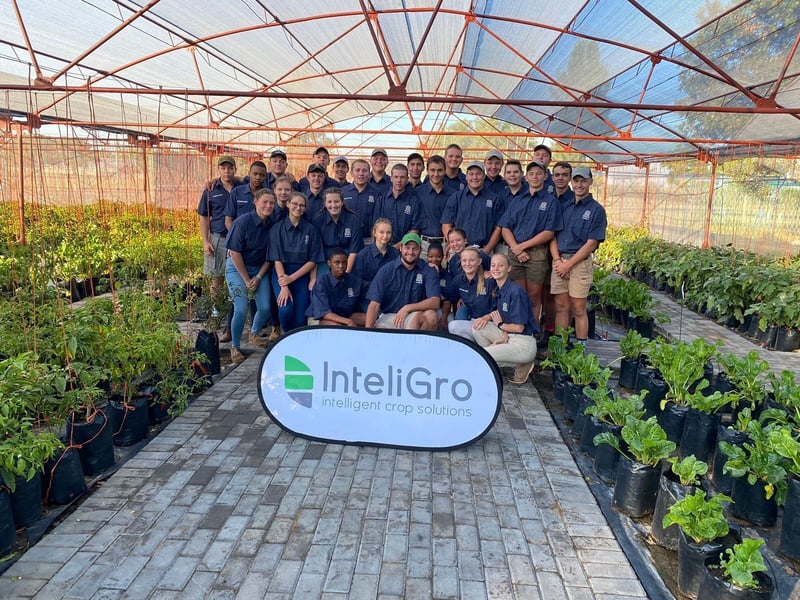Sowing Responsibility - How Compliance Is Cultivating the Future of South African Agriculture
Written by: Isabeau Botha Save to Instapaper
As the world observes World Day for Safety and Health at Work on 28 April, InteliGro is driving home an important message: in agriculture, compliance is no longer merely a legal requirement – it is a strategic, ethical, and environmental responsibility.
As a leader in integrated crop solutions, InteliGro is intensifying its efforts to promote a deeper understanding of compliance across the agricultural value chain. From farmers and Crop Advisors to agri-businesses, the company is helping to build a culture in which compliance becomes second nature, not just an obligation.
“At InteliGro, we believe in setting the benchmark for responsible, future-focused farming,” says Stefan van Dyk, General Manager of InteliGro North. “That’s why we’re investing in educating the industry on what compliance really means, and why it matters.”
MORE THAN A CHECKLIST
Van Dyk emphasises that compliance is not about ticking boxes but about doing the right thing. Every step in the agricultural process, from product handling and storage to worker safety and environmental management, is governed by legislation designed to protect both people and the planet.
“Yes, compliance can be complex, but when we’re talking about food safety, environmental protection, and the well-being of workers and consumers, it isn’t a nice-to-have, it’s essential,” Van Dyk explains. “Compliance means building a system that reaches everyone involved, including Crop Advisors, agrochemical manufacturers, distributors, and most importantly, the farmer and farm workers on the ground.”
BUILDING A CULTURE OF COMPLIANCE
InteliGro’s approach goes far beyond meeting minimum requirements. The company works closely with CropLife South Africa and regulatory bodies to align with key legislation, including:
- the Fertilisers, Farm Feeds, Agricultural Remedies and Stock Remedies Act (1947) (Act No. 36 of 1947)
- the Hazardous Substances Act (1973) (Act No. 15 of 1973)
- the Occupational Health and Safety Act (1993) (Act No. 85 of 1993),
- and various environmental protection acts, including SANS 10206, which governs the safe handling and disposal of pesticides.
“Our Crop Advisors are in the field every day,” says Janet Lawless, National Marketing Manager at InteliGro. “They are trusted partners to farmers and that trust allows them to guide, support, and raise the bar when it comes to safety and sustainability.”
“Through structured risk and compliance support, InteliGro provides the following at farm level:
- Regulatory guidance and training: Practical support to comply with Act 36, GHS standards and restricted use products, via PCO (Pest Control Operator) registration and ongoing updates.
- Stewardship training: On-farm sessions and spray clinics with a focus on correct application, label compliance and safety protocols.
- Waste management: Certified programs for the disposal of expired chemicals and triple-rinsed empty containers, in line with CropLife SA and GlobalG.A.P. (Good Agricultural Practices) requirements.
- Documentation and audit support: Templates, certificates and advisory tools to assist producers with traceability and audit readiness."
WHY IT MATTERS
Non-compliance is not just risky; it can have serious consequences. From reputational damage and legal repercussions to halted operations and increased environmental risks, the costs can be significant. But companies that embrace compliance are positioning themselves as leaders who are trusted, forward-thinking, and resilient.
“Compliance reflects how you operate,” Lawless says. “It sets the tone for everything, from how you manage people and resources to how the public perceives your brand. Thus, compliance is a long-term investment in your business and in the future.”
A COMMITMENT TO THE FUTURE
Looking ahead, InteliGro remains committed to helping clients and partners navigate evolving regulatory landscapes while building strong, future-ready agri-businesses.
“The message is clear, compliance is not a burden, it is an opportunity,” says Van Dyk. “Ultimately, compliance is about protecting lives, preserving the environment, and ensuring that agriculture remains a respected, sustainable industry for generations to come.”
Key Regulations to Know:
(Provided by CropLife South Africa)
- Fertilizers, Farm Feeds, Agricultural Remedies and Stock Remedies Act, 1947 (Act No. 36 of 1947)
- Hazardous Substances Act, 1973 (Act No. 15 of 1973)
- Occupational Health and Safety Act, 1993 (Act No. 85 of 1993)
- SANS 10206: The Handling, Storage and Disposal of Pesticides
- National Environmental Management Act, 1998 (Act No. 107 of 1998)
- National Environmental Management: Waste Act, 2008 (Act N. 59 of 2008)
- National Road Traffic Act, 1996 (Act No. 93 of 1996)
Get new press articles by email
Public relations, social media management, communication: food, wine, agriculture, awards functions & events.
Latest from
- Love and legacy, poured - Nuy releases Toekie ‘My Hartedief’ Red Muscadel 2025
- AmberMacs Expo shows the way forward
- Peeling back the Petals, a Focus on Flowers in Art
- Harvest time tastes and traditions celebrated at La Motte
- 2026 Dates La Motte Milling & Bread Baking Experience
- La Motte Wine Harvest 2026
- La Motte Classical Music Concert 17 January
- Always Breaking Bread at La Motte on 29 December 2025
- The flair and joy of festive gift giving at La Motte
- Introducing La Motte Inheems
- Switch on the Sparkle with Leopard's Leap
- La Motte brings you - The Festive Four
- Leopard's Leap The Sunset Smooth Event - 20 December 2025
- Another reason to celebrate with La Motte
- Sauvignon Blanc SA Seminar - unpacking the cultivar with styles
The Pulse Latest Articles
- Opinion Piece: Activating Leadership To Engage The Passive Workforce (February 11, 2026)
- Tchagra Trail Wilderness Consulting Launches A New Safari Experience In Photography And Tracking (February 9, 2026)
- Magic: The Gathering Releases Lorwyn Eclipsed (February 6, 2026)
- Back To Work, Back To Balance: Rethinking The 3pm Slump (February 5, 2026)
- Back-to-school Lunchboxes That Just Make Sense (February 5, 2026)
